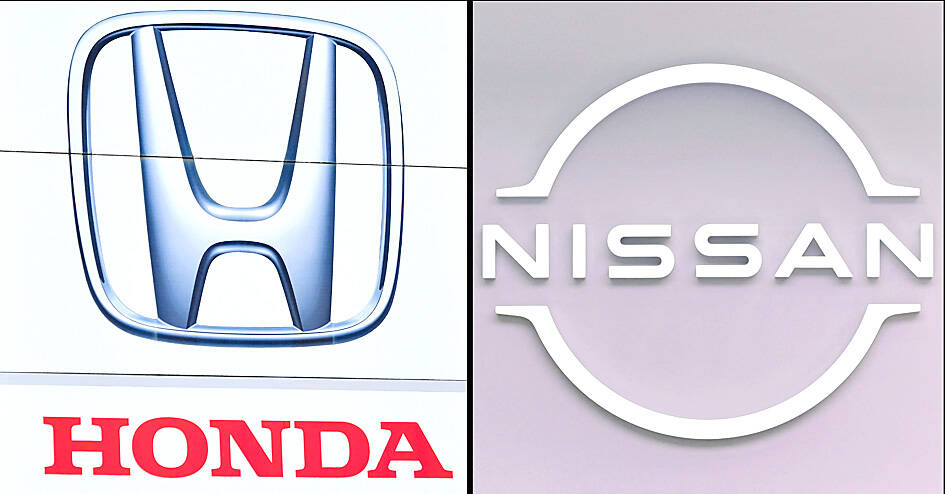Japanese automakers Honda Motor Co, Nissan Motor Corp and Mitsubishi Motors Corp yesterday said that they are dropping their talks for a business integration.
The automakers agreed to end their deal regarding the consideration of the structure for a collaboration, they said in a joint statement.
Honda and Nissan in December last year announced that they were going to hold talks to set up a joint holding company.

Photo: AFP
Mitsubishi had said it was considering joining the group.
From the start, the effort had analysts puzzled as to the advantages to any of the companies, as their model lineups and strengths overlap in an industry shaken by the arrival of newcomers such as Tesla Inc and BYD Co (比亞迪), as well as the move to electrification.
Honda and Nissan initially said that they were trying to finalize an agreement by June and set up the holding company by August.
The three automakers would continue to work together on electric vehicles and smart cars, such as autonomous driving, the statement said.
In the past few weeks, Japanese media had reported about the talks breaking down, citing unidentified sources.
Some said that Nissan balked at becoming a minor player in the partnership with Honda.
Honda is in far better financial shape and was to take the lead in the joint executive team.
The company yesterday reported a 7 percent decline in profit for the nine months that ended in December last year, as its motorcycles business was strong, but its auto sales suffered in China and Japan, while demand stayed solid in the US.
Honda’s April-to-December profit totaled ¥805 billion (US$5 billion), down from ¥869.6 billion in the same period in 2023.
Nine-month sales gained nearly 9 percent to ¥16.3 trillion.
Meanwhile, Nissan yesterday said it expected an annual net loss of ¥80 billion for the fiscal year ending March 31 owing to slumping sales.
The company also lowered its annual operating income outlook to ¥120 billion from ¥150 billion, which was already a major downgrade from its starting guidance of ¥500 billion.
Additional reporting by Bloomberg

SEEKING CLARITY: Washington should not adopt measures that create uncertainties for ‘existing semiconductor investments,’ TSMC said referring to its US$165 billion in the US Taiwan Semiconductor Manufacturing Co (TSMC, 台積電) told the US that any future tariffs on Taiwanese semiconductors could reduce demand for chips and derail its pledge to increase its investment in Arizona. “New import restrictions could jeopardize current US leadership in the competitive technology industry and create uncertainties for many committed semiconductor capital projects in the US, including TSMC Arizona’s significant investment plan in Phoenix,” the chipmaker wrote in a letter to the US Department of Commerce. TSMC issued the warning in response to a solicitation for comments by the department on a possible tariff on semiconductor imports by US President Donald Trump’s

The government has launched a three-pronged strategy to attract local and international talent, aiming to position Taiwan as a new global hub following Nvidia Corp’s announcement that it has chosen Taipei as the site of its Taiwan headquarters. Nvidia cofounder and CEO Jensen Huang (黃仁勳) on Monday last week announced during his keynote speech at the Computex trade show in Taipei that the Nvidia Constellation, the company’s planned Taiwan headquarters, would be located in the Beitou-Shilin Technology Park (北投士林科技園區) in Taipei. Huang’s decision to establish a base in Taiwan is “primarily due to Taiwan’s talent pool and its strength in the semiconductor

Industrial production expanded 22.31 percent annually last month to 107.51, as increases in demand for high-performance computing (HPC) and artificial intelligence (AI) applications drove demand for locally-made chips and components. The manufacturing production index climbed 23.68 percent year-on-year to 108.37, marking the 14th consecutive month of increase, the Ministry of Economic Affairs said. In the first four months of this year, industrial and manufacturing production indices expanded 14.31 percent and 15.22 percent year-on-year, ministry data showed. The growth momentum is to extend into this month, with the manufacturing production index expected to rise between 11 percent and 15.1 percent annually, Department of Statistics

An earnings report from semiconductor giant and artificial intelligence (AI) bellwether Nvidia Corp takes center stage for Wall Street this week, as stocks hit a speed bump of worries over US federal deficits driving up Treasury yields. US equities pulled back last week after a torrid rally, as investors turned their attention to tax and spending legislation poised to swell the US government’s US$36 trillion in debt. Long-dated US Treasury yields rose amid the fiscal worries, with the 30-year yield topping 5 percent and hitting its highest level since late 2023. Stocks were dealt another blow on Friday when US President Donald